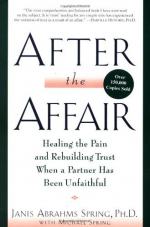
|
| Name: _________________________ | Period: ___________________ |
This test consists of 15 multiple choice questions and 5 short answer questions.
Multiple Choice Questions
1. What is the second phase of post-affair healing?
(a) Moving the unfaithful partner out of the house.
(b) Working to recommit on an intimate level.
(c) Deciding whether to separate or stay together.
(d) Telling the children about the affair.
2. The unfaithful partner may experience physical changes from romantic love that can be expected to last how long?
(a) When they're with their lover.
(b) The rest of their life.
(c) Throughout the affair.
(d) A short time.
3. All extramarital affairs are viewed in which way by the text?
(a) Excusable.
(b) Unforgivable.
(c) Inevitable.
(d) Damaging.
4. If the disenchantment felt in an aging relationship is mismanaged, it can lead to which result?
(a) Temporary separation.
(b) An extramarital affair.
(c) Jealousy and anger.
(d) Bitterness and resentment.
5. How is the religious faith of hurt partners affected after an affair?
(a) They reject the sacredness of marriage.
(b) They blame God for their suffering.
(c) They find solace in church.
(d) They convert to a different religion.
6. After an affair, the marital relationship faces which two options?
(a) Renogotiation or openness.
(b) Discussion or counseling.
(c) Termination or ignorance.
(d) Dissolution or recommitment.
7. How should partners treat their unrealistic expectations of love and marriage?
(a) Decide mutually to forget them.
(b) Examine their origins.
(c) Undergo couples counseling.
(d) Critique each others' beliefs.
8. Why does the author deliberately chose particular words and phrases to use in the book?
(a) To create a new language for the partners.
(b) To eliminate stereotypes about infidelity.
(c) To help the couple speak openly about their problems.
(d) To avoid emotionally charged labels.
9. If the hurt partner chooses to remain with the unfaithful partner even though the relationship is dysfunctional, which term described this type of love?
(a) Unrequited.
(b) Unforgiveable.
(c) Unjustified.
(d) Unbelievable.
10. The stage of disenchantment in a relationship can be described with which term?
(a) Unexpected.
(b) Sudden.
(c) Unhealthy.
(d) Normal.
11. What is the fundamental difference between the hurt and unfaithful partners' reactions to the affair?
(a) The relgious beliefs of the unfaithful partner may be devastated.
(b) The sense of self-respect of the hurt partner may be strengthened.
(c) The personal identity of the hurt partner may be unaffected.
(d) The sense of self of the unfaithful partner may have benefited.
12. Why would the hurt partner feel as if they are disposable?
(a) They lose the sense of being special.
(b) They cannot accurately express their emotions.
(c) They compare themselves to the lover.
(d) They regret the time lost with their partner.
13. What is the main purpose of the book?
(a) To advise a couple on how to regain sexual intimacy.
(b) To guide a couple through a divorce.
(c) To instruct a couple on how to stay married.
(d) To help a couple survive an affair.
14. The signs of an affair are often treated in which way by the hurt partner?
(a) They are ignored.
(b) They are confronted.
(c) They are accepted.
(d) They are explained away.
15. If a partner exhibits signs of change, how could the other partner view this change?
(a) As insincere and untrue.
(b) As temporary and only for show.
(c) As heartfelt and lasting.
(d) As deserved and needed.
Short Answer Questions
1. Warning signs that the unfaithful partner is likely to pursue future affairs include which behavior?
2. How many reasons does the book address that could explain a lack of guilt on the part of the unfaithful partner?
3. Which term does the book use to describe the partner who is involved in the affair?
4. Negative and destructive thoughts are linked to which psychological effect suffered by the hurt partner?
5. Connecting with friends and family in the wake of an affair is perceived how by the hurt partner?
|
This section contains 634 words (approx. 3 pages at 300 words per page) |

|




